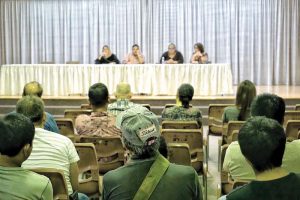NMBAC: 13K CW cap possible
On stage are Northern Marianas Business Alliance Corp. officer and members, from left, Gloria Cavanagh, Alex Sablan, Viola Alepuyo, and Josephine Mesta at the open discussion Tuesday night at the Pedro P. Tenorio Multi-Purpose Center in Susupe. (Bea Cabrera)

The Northern Marianas Business Alliance Corp. is optimistic that the CNMI-Only Transitional Worker program would be extended in the same form or another after 2019, but not in the numbers it has asked for.
During last Tuesday’s open discussion at the Pedro P. Tenorio Multi-Purpose Center in Susupe, NMBAC officer Viola Alepuyo said the trip to Washington, D.C. was intended to “basically pound the pavement” and have meetings in order to explain to various congressional committees what the CNMI has done in the past and what the government and private sector need going forward with regards to the CW issue.
“What we did get from them is, yes, they understand that we need CWs… but we won’t get the 18,000 workers that was one of our requests. They also said they realize that the current number of 9,998, after the 3,000 reduction, wasn’t enough,” she said.
Alepuyo said they were informed that 13,000 slots is a possible number but there are no guarantees.
“We explained to them that 13,000 is much appreciated but this number will only help us maintain the status quo, to keep things the way they are right now. It’s not going to address what’s going to happen with the workforce [that] we [will] need once Honest Profit hotel in San Antonio, the IPI hotel and casino in Garapan, and Michael Kwan’s [hotel] in San Roque opens,” she said.
Alepuyo said these new hotel projects are additional rooms for the CNMI’s booming hospitality industry. However, with no workers, what would hotel owners do with those rooms, she asked.
“Again, we appreciate the 13,000 slots but it’s not enough to grow our economy,” she added.
NMBAC president Alex Sablan said the 18,000 request is based on room counts and current developments that are being built in the CNMI.
“That number was a product of us going through all of the projects and establishing what the numbers are going to be room for room. Currently, as per the Hotel Association of the Northern Mariana Islands, the number is 0.7 to headcount per room, so there’s under one individual or three fourths of an individual,” he said.
“But the future holds that, with 4- and 5-star developments that are coming, we will need at least 1 to 1 or 1.5 to one room headcount and that is based on the projections being tossed out. We have Alter City [Group] that is looking at 2,000 to 3,000 rooms and we have the IPI contract with the government based on law that requires them to put up at least 2,000 rooms,” he added.
In an interview last October, Gov. Ralph DLG Torres shared this concern when only a certain number of contract workers are maintained in the CNMI.
“If we only maintain that, that means our economy can only grow that much. It’s a steady economy because of our labor. But if we do not increase labor, our economy will also not increase,” he said.
‘Not enough workers’
During NMBAC’s meetings with various committees of the House and Senate, the group emphasized that there is just not enough U.S. citizens or U.S-eligible workers to go around in the CNMI.
“We brought data that we have requested from the CNMI government… they wanted to know what exactly the government and the business community have done in the past to transition foreign workers out and get U.S. citizens the jobs,” Alepuyo said.
“We did that in a report that we submitted to them. We explained that even if we gave every U.S. citizen who is not employed a job, it’s still not enough and it still would not address the workforce necessary in the CNMI,” she added.
Alepuyo said that even the U.S. Government Accountability Office, an independent government agency, came out and said the CNMI cannot survive without the CW program.
The GAO report released in May 2017 stated that the labor market of the Commonwealth of the Northern Mariana Islands is growing and continues to rely on foreign workers. In 2015, foreign workers made up more than half of the CNMI’s workforce.
The GAO report further stated that the Department of Homeland Security aims to eliminate all CW permits that allow foreign nationals to work in CNMI by the end of 2019. However, the agency’s economic analysis estimated that, without foreign workers, the CNMI’s 2015 gross domestic product would be reduced by 26-62 percent.
Alepuyo said the 62-percent drop in the CNMI economy is not a simple matter.




